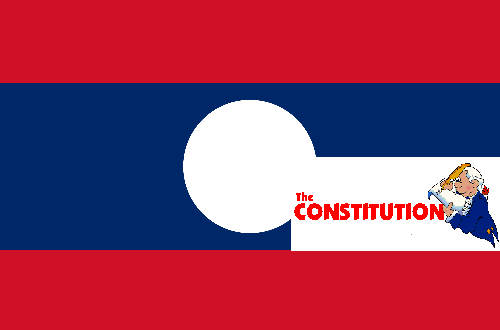Amended Constitution Creates Provincial Assemblies, Gives President Two Terms
The newly-amended constitution passed recently by the National Assembly (NA) has allowed the establishment of provincial assemblies (PAs) for the first time, which are set to function in an NA-like role as local parliaments.
The fundamental role of the provincial assemblies will be to consider and approve legislation issued by local authorities.
The PAs will also consider and approve socio-economic development and budget plans and follow up the performance of local authorities, including the implementation of their socio-economic development plans.
The constitution also stipulates, for the first time, that the president can hold office for not more than two consecutive terms.
The previous constitution, which was amended in 2003, did not indicate how many terms the president was permitted to serve. Neither was the term of office spelt out in any law or regulation.
President Souphanouvong, the country’s first president after the Lao PDR was proclaimed on December 2, 1975, is the only one among five presidents to date to have held office for more than two terms. President Souphanouvong held office for 16 years from 1975-1991.
The country’s president is elected by the NA with the number of votes in favour to be at least two thirds of the total number of NA members.
The president’s term of office runs for five years, the same as the term of the NA’s legislature, according to the newly amended constitution.
Lao citizens aged 18 years or older are eligible to vote and elect NA members. Those aged 21 or older are eligible to stand as candidates for election as NA members.
The new amendment attaches great importance to prot ecting the freedom and democratic rights of the people. All forms of bureaucratic threats and actions that undermine the physical and mental wellbeing or the dignity of the people are prohibited. Also prohibited are actions that cause damage to their rightful assets.
The amendment also attaches great importance to ensuring solidarity and equal rights among the multiethnic people.
All forms of action that seek to break up solidarity or discriminate amongst ethnic groups are prohibited.
In addition, the amendment focuses on cultural, social and economic development associated with sustainable environmental protection, while priority is also given to human resource development.
Under the amendment, the state places greater importance on scientific research and the use of science and technology to drive development, while protecting intellectual property rights.
Foreign nationals in Laos as well as those who have no nationality will also have their rights protected, in line with the relevant laws.
The original [first] Lao constitution was approved by the NA in 1991. On August 15, 1991 the constitution was promulgated – 16 years after Lao People’s Democratic Republic was proclaimed on December 2, 1975. December 2 is Lao National Day. August 15, 1991 has been proclaimed as Laos’ Constitution Day.
The newly-amended constitution consists of 14 chapters and 119 articles. The constitution is the country’s fundamental law and the formulation of all laws must coincide with the constitution.
Only the National Assembly is eligible to amend the constitution and changes will be approved only when more than two thirds of NA members vote in favour.
Source: Vientiane Times

